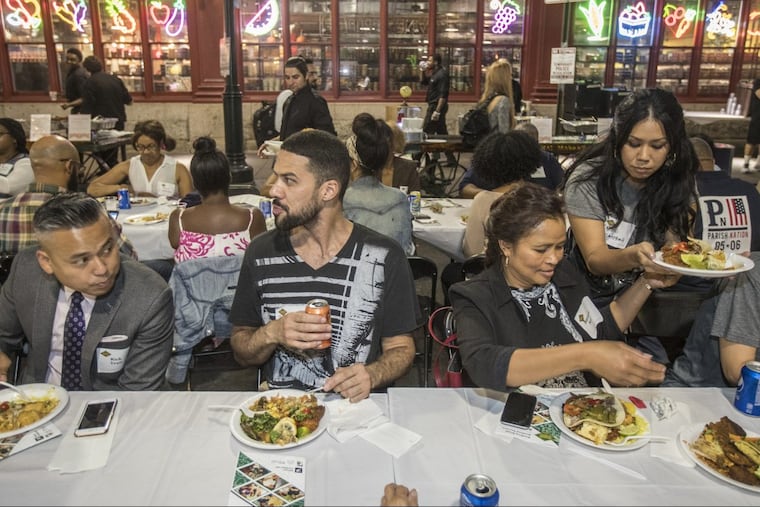At Reading Terminal Market, cultures come together more than anywhere else in the city
Monday's dinner was the finale of the "Breaking Bread, Breaking Barriers" program, designed to bring communities together through food.

A mother from Syria filled a plate with Chinese dumplings for her and her son as nearby a family from Korea sampled collard greens and corn bread. Following a performance by a group of Mummers, who strutted and spun before the more than 150 diners assembled at tables outside of Reading Terminal Market, three young women performed traditional Cambodian dances.
Monday night was the finale of "Breaking Bread, Breaking Barriers," an ambitious program launched last year by Reading Terminal Market, the city's Human Relations Commission, the resettlement agency HIAS Pennsylvania, and the Penn Project for Civic Engagement that was aimed at encouraging immigrant and native communities to learn about each other and find common ground through food.
Since it began last fall, with cooking demonstrations and meals hosted by Reading Terminal, Mummers have eaten with members of the city's Asian and Latino communities, West African immigrants have mingled with longtime West Philly residents, and Syrian refugees have met their neighbors in the Northeast. Some of the traditional dishes made and shared included roast pork from South Philly, latkes and chicken shawarma.
Participants were identified through the city's resettlement agencies and nonprofits, as well as by community leaders.
Anuj Gupta, general manager of Reading Terminal Market, acknowledged that a few dinners weren't enough to fix long-standing tensions among members of some of the city's ethnic groups.
"But we guarantee ourselves failure if we don't at least try," he said. "In my lifetime, there's never been a more important time for facilitating dialogue like this. Philadelphia is diversifying at a rate we haven't seen in over 100 years, and that's good for the city. But people must be able to see each other as human beings."
Though the program's overarching goal has been to foster understanding through discussions of racism and difficult topics, many participants said they drew the most satisfaction from smaller victories. At one dinner, refugees from Syria talked about the hostility they felt from their neighbors, said Nasr Saradar of the Nationalities Service Center. After some discussion at the dinner, the refugees committed to smiling and saying hello anyway.
"Now, they tell me the responses are changing," he said. "People are becoming friendly. They are starting to help, if someone has a child they need to get registered for school. They are caring more."
Cultural differences can feel stark. Luai Al Atmah, a Syrian national who was resettled last year in Philadelphia, said his Northeast community still lacked the closeness he and his family were used to.
"Part of our culture is to take care of your neighborhood, your town, your community as one," he said, as Saradar translated for him. "If one person has a problem, you all come together. In one community, you could get 10 times this number of people in one wedding."
Saradar, 34, a Syrian refugee who spent four years in Egypt, said that when he and his wife moved to South Philadelphia last year, they were confronted by teenagers who accused them of being terrorists.
"I was afraid to tell them where I was from," he said. "I told them I was from Egypt. I was ashamed of being Syrian. … Now I would not lie."
The "Breaking Bread, Breaking Barriers" program was inspired in part by sociologist Elijah Anderson's book The Cosmopolitan Canopy: Race and Civility in Everyday Life and funded by an $85,000 grant from the Knight Foundation. In the book, Anderson, a Yale sociology professor, walked readers through different parts of Philadelphia, observing how residents interacted across racial lines, and found that Reading Terminal Market was the "canopy" under which cultures had come together more organically than anywhere else in the city.
"You see a businessman eating fried chicken. You see a black person eating baklava," Anderson said Monday. "It's a space of convergence, and it happens every day without anyone even thinking about it."
Monday's dinner guests, who were from 12 ethnic backgrounds, shared a buffet that included Korean chicken wings, falafel, West African vegetable yassa, and tacos from South Philly's El Compadre.
"This is really about the power these communities have to change the narrative," said Patrick Morgan of the Knight Foundation. "We're learning about not only the power of food, but that it's possible for people to come together for these conversations as a starting point. When you think about Mummers and members of the Asian community talking about dumplings — what is ravioli but a dumpling?"